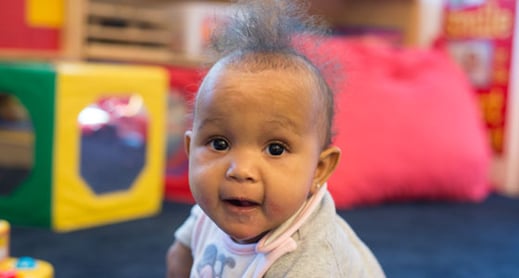
As part of the recent federal Early Head Start–Child Care Partnership grant initiative, Early Learning Ventures (ELV) was awarded an annual grant of $3.1 million to serve 240 children and families in Arapahoe, Garfield, Mesa, and Pueblo counties in Colorado. ELV will combine the comprehensive nature of Early Head Start services with our shared services model, which uses networks of independent child care centers and family child care providers to promote business efficiencies and quality among small providers in each community. Approximately 30–40 licensed child care centers and family child care homes (approximately 60–70 classrooms) will participate in this innovative model to increase program quality as well as school readiness for all children and families. With the idea that school readiness is a shared responsibility and that quality improvement is much broader than what occurs in the classroom or by any one individual, the ELV Partnership model affords an equitable distribution of resources for participating child care providers. The ELV Partnership model supports programs in five areas that are key to program quality:
These building blocks of program quality provide a strong foundation for supporting children’s development and potential as successful learners.
Thus far, by approaching program quality in this manner, we have found more buy-in and lower stress levels from center leadership, teachers, and families as well as a more meaningful experience for everyone involved. Historically, the distribution of funding designated for improving quality and school readiness is, disproportionately and unintentionally unfairly, applied toward expectations for teachers and the classroom environment. Although both elements are important, this approach does not always consider the other key factors necessary for enhancing quality and preparing children for school.
Understanding that effective teacher–child interactions are the best predictors of children’s school readiness, ELV is committed to improving teaching and learning at all levels. With positive interactions being one of the intended outcomes, the ELV Partnership Model creates meaningful change by simultaneously strengthening the five key functions that are foundational to supporting school readiness. This comprehensive approach is especially important since children’s behavior is influenced by their experiences in multiple settings. Below, ELV’s Partnership Model outlines the five key functions, which are critical in supporting the levels of program quality necessary to promote healthy development and learning.
ELV 5 Level Quality Improvement Support Framework
Level 1: Strong Business
Participating licensed childcare programs will join the network for ELV’s Shared Services, which includes achieving economies of scale, shared buying power, utilizing a childcare data management system, and back office supports such as recruitment and financial management. The focus is to develop and implement a strategic business plan and budget that will ensure, amongst many things, competitive wages for teachers and teacher assistants and the delivery of high quality school readiness programming.
o Outcome: To increase the overall Quality Rating of the childcare center program and family childcare home.
Level 2: Sound Leadership
Program directors will participate in a rigorous training program geared toward leadership and sustaining their childcare business, which includes a designated mentor. The focus is twofold: increase communication between directors, classroom staff, and families and enhance directors understanding of how to impact classroom quality with sound leadership.
o Outcome: To institute a comprehensive system of support for teachers and teacher assistants to effectively implement research-based best practice.
Level 3: Prepared Teachers
Teachers and Teacher Assistants will receive, at minimum, 30–40 hours of coaching annually to strengthen their understanding of child development and best practice. Additionally, credential and degree seeking scholarships will be made available to all. The focus is to increase teacher and teacher assistant understanding of child development and implementation of research-based best practice.
o Outcome: To increase consistency of teacher-child interactions, and continue to professionalize the early childhood education field in Colorado
Level 4: Engaged Families
Families will receive ongoing mentoring and research-based training to enhance their understanding of their child’s development, effective parenting techniques, and becoming a strong advocate for their child. Additionally, all families will have access to in-depth case management to support goal development and assist with sustainability. The focus is twofold, first to empower parents by increasing their confidence when navigating community services and resources; and second to establish consistency in how teachers and parents communicate.
o Outcome: To engage parents in, a meaningful way, their child’s educational process.
Level 5: Community Involvement (comprehensive services)
ELV will partner with up to six community agencies in each of the four counties to deliver comprehensive services for children. Through these partnerships, focused educational opportunities and supplemental consultation will be afforded to parents and center staff.
o Outcome: Ensure children’s basic health, dental, mental health, nutrition, and other needs are met.
To drive continuous improvement as well as inform professional development, ELV will use the Classroom Assessment Scoring System (CLASS) Infant and Toddler tools to measure improvements in classroom quality and teacher–child interactions over time. We will also use other tools to inform implementation and document the overall success and challenges of the model, such as interviews with program directors and community partners, a measure of child care staff perceptions of workplace supports, family perceptions of program support, and examining children’s progress in development and learning.
By taking this comprehensive approach to strengthening the capacity of programs, families, and communities, we are ensuring that children have access to a broad environment of supportive, responsive interactions and relationships with adults.

Lionel Espinoza is the Early Head Start (EHS) Director at Early Learning Ventures, Colorado’s newest EHS Grantee where his primary role is to build an innovative comprehensive program for children and families in four Colorado Counties which will be accomplished by partnering with community leaders to leverage existing resources. With over 15 years of experience in leadership and program development in the Early Childhood Education sector, his focus has always been to strengthen and sustain education systems and programs for children and families. Backed with a Master of Arts degree in Education, Lionel is currently finishing a second Master of Science degree in Organizational Leadership at Regis University.

